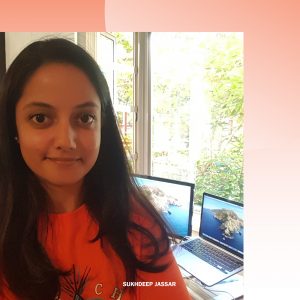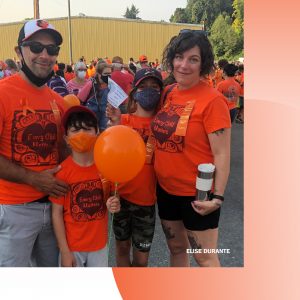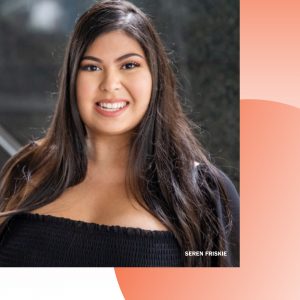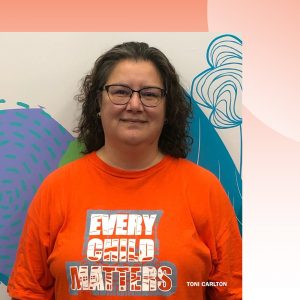As news of unmarked graves continue throughout Canada, Foundry’s role as a settler organization continues to be important in calling out and dismantling colonialism, while also working respectfully to hold and nurture relationships with Indigenous Peoples, including Indigenous youth and family advisors, staff, lead agencies and partners, who lead, guide and inform our work.
On Orange Shirt Day and National Day for Truth and Reconciliation, we are commemorating the history and ongoing trauma caused by the residential school system, and honouring the 150,000 Indigenous children forcibly taken from their families, those children who never returned home as well as the survivors, families and communities who continue to grieve.
Below are personal reflections from Foundry staff members on what this day means to them – from the perspective of settlers as well as from the Indigenous Wellness Team.
Sukhdeep Jassar, Community Development Liaison

As a settler, what are some thoughts/reflections that you’d like to share around National Day for Truth and Reconciliation, a new federal stat holiday, which addresses the call to action #80 of the TRC report?
We need to make the TRC 94 Calls to Action a reality. We asked Indigenous people to speak of their experiences and traumas, which are ongoing. We have a responsibility to do what was asked and holding a National Day for Truth and Reconciliation does that.
In BC, people working in the public sector (e.g. health, government, schools, post-secondary institutions) have been encouraged to take the day off for reflection. Other provinces have not taken the same direction and it is not a stat day for public sector employees. This inaction in other provinces reflects the systemic discrimination and racism that exists in our country.
Knowing what we know, why aren’t we making space for reflection and action and change?
As a settler organization, Foundry is continuing our role and responsibility in creating culturally safe and respectful environments for our staff, youth and families/caregivers in the work we do. The ongoing news of unmarked graves have forced all of us to re-think how we celebrate awareness days like Canada Day and Thanksgiving moving forward.
What does this bring up for you as a settler?
Growing up, I found it challenging to belong as a small brown girl in a very white town. My family’s beliefs and culture did not fit within Canadian norms. The SnPink’tn Reserve was on the opposite side of the river that ran through town. I learned about Residential Schools while in a Peer Counselling class and was baffled and horrified about how ignorant I had been, and how ignorant people remained. When I started learning, I talked to my parents about what had happened. At this stage, I did not feel personal accountability or responsibility for what was going on, rather it was something that white Canadians had done.
While I was young, my dad spoke of returning to India. A lot. We celebrated Christmas, but Santa, the Easter Bunny and Tooth Fairy did not exist; Thanksgiving held no meaning. We celebrated Lohri, Diwali, Vaisakhi and weddings. Watching my parents transition from considering themselves Indian to Canadian was a process that took over 10 years.
Reorganizing my framework from “this is what is Canadian” as beavers, flannel, maple syrup and lumberjacks, to including diverse groups of immigrants and their stories happened while I was at UBC. Reading stories of people who experienced life as I did mattered to my personal reframing, so did meeting people who had faced similar challenges. It felt good. I put my learnings of Indian Residential Schools on the backburner while I worked on discovering my heritage.
The last decade has been about owning my inherited responsibility to cultivate a place that I want to belong to; a geographic space of people that take responsibility for what happened and acknowledges the resilience of Indigenous Peoples across Turtle Island, as well as the rights and reparations of Indigenous Peoples who may have not “owned” the land, but who tended to and lived in harmony with it.
My parents came here to give me a “better life”. They did not understand that they were occupying stolen lands, and like the British who colonized India, they were benefiting from oppression of Indigenous nations. I grew up on an orchard, ripping out Indigenous plants to plant crops for capital. Now it’s time to sow seeds for a place that is equitably healthier for all. We may need to rip out some plants first though.
How can you create meaningful change as an ally to Indigenous Peoples?
In health care, we are in the business of fixing others. However, the In Plain Sight report made it clear that we are the ones in need of changing and fixing. That change comes from how we develop leaders, policies and processes and how central equity is in the process. It means supporting staff and leaders to communicate and discuss power, experience and privilege. It means getting uncomfortable and not shutting down conflict. In my role, I hope to support more spaces of discomfort, and improve how policies, processes and behaviours can embed equity from the first step.
As a settler, what are you doing on National Day for Truth and Reconciliation to commemorate the history of residential schools and ongoing news of unmarked graves?
I will be listening to Tanya Talaga’s All Our Relations Massey Theatre Lecture and reading excerpts from The Survivors Speak volume from the final Truth and Reconciliation Commission report. I will also be going for a walk on the lands of the xʷməθkwəy̓əm (Musqueam) Nation with a friend to reflect on our role in changing what is, and in embracing discomfort and change when it comes to reconciliACTion.
Elise Durante, Leader, Service Integration and Implementation

As a settler, what are some thoughts/reflections that you’d like to share around National Day for Truth and Reconciliation, a new federal stat holiday, which addresses the call to action #80 of the TRC report?
This is such an important step in an ongoing journey. For me, this day will be a time to reflect and review on where and how am I taking responsibility and action in line with the TRC report. It’s a time to pause and reflect on what more I can do, and for me to reflect on my own European ancestors and why they came here, and to bring the good of that spirit – creating a better life for their children – and extending it to the responsibility to create a better life for all the children.
As a settler organization, Foundry is continuing our role and responsibility in creating culturally safe and respectful environments for our staff, youth and families/caregivers in the work we do. The ongoing news of unmarked graves have forced all of us to re-think how we celebrate awareness days like Canada Day and Thanksgiving moving forward. What does this bring up for you as a settler?
Responsibility – I need to listen and to tell the entire story behind these holidays, behind the “federation of Canada”… not to collude with the settler and colonial perspectives only. We need to embed the local histories of the lands we are on in all the education of what is now called British Columbia.
How can you create meaningful change as an ally to Indigenous Peoples? (Note: Your response can be framed both personally as well as in the context of our work at Foundry).
I can learn what wellness means in communities and to help advocate and explore ways to have the teachings of Indigenous wellness front and centre, not siloed off…
As a settler, what are you doing on National Day for Truth and Reconciliation to commemorate the history of residential schools and ongoing news of unmarked graves?
There are gatherings in my community, and I will be attending one of those with my family. I will continue to have conversations with my children about what this all means, and to learn from them what they are learning first-hand from their friends and elders in our community.
I hope to show my children how we take responsibility in respectfully honouring Indigenous Peoples and move towards more reciprocity in our relationships and ways of being.
And I will remind my own children that we are in this together, that we have the responsibility of moving forward in a better way than our ancestors, moving beyond a Euro-centric vision, and into a way that honours and remembers all the folks that have come before us and that we walk alongside now.
Seren Friskie, Youth Peer Engagement Coordinator | Indigenous Wellness Team

With National Truth and Reconciliation Day coming up, what are some thoughts/reflections that you’d like to share around this new federal stat holiday, which addresses the call to action #80 of the TRC report?
With National Truth and Reconciliation Day being honoured across the country, I hope this marks a time for change, a time to take the Truth and Reconciliation Commission’s Calls to Action seriously, and grieve the losses we have felt in our communities while also celebrating the resilience of our Nations who are here, despite the colonial violence acted upon them.
I would like to say that I am very disappointed in those who are not honouring this day as a time to focus on Indigenous healing, needs, and community. There is a kind of “get over it” attitude that some Canadians hold, which doesn’t sit well with me. I hope this would be a day to come together, support Indigenous needs and make them a priority for all.
The damage of colonialism is continuous and Indigenous Peoples have welcomed non-Indigenous folks into sacred spaces, demonstrations and peaceful joining of hands, so it is quite disheartening to see those who turn away from that. We all have a role to play in Reconciliation, and we all can positively impact our communities to reflect on our painful legacy through hope, our youth and strength in culture.
As a settler organization, Foundry is continuing our role and responsibility in creating culturally safe and respectful environments for our staff, youth and families/caregivers in the work we do. From your perspective, what are some things that you want to see from Foundry around anti-racism and allyship, especially in light of the ongoing news of unmarked graves at former residential school sites?
Indigenous Peoples and those with lived experience as a youth, caregiver, etc. need to be honoured and compensated for the knowledge and emotional labour they bring to professional spaces, be that as a front-line peer support worker for example, or a project coordinator – we as an organization use and build on those integral and sacred wisdom every day, and we need to honour that.
A settler organization that looks to make meaningful change cannot do this without changing from within. The values of such an organization need to be rooted in the values of allyship, anti-racism, intersectionality and decolonial thought. I would like to see leadership think directly with the TRC Call’s to Action and all of the other reports to see what we as individuals and as those working with youth and in healthcare can do to live these actions.
I am wondering, what are we as an organization willing to give up? Where do we place humility? How do we humble ourselves as learners/students and not always experts? What power and privilege can we share or give up for others to lead?
What would you say to someone who wants to learn more about Indigenous History? What can settlers do to show up as allies for our local Indigenous community?
There are so many wonderful books, podcasts, films, plays, art and classes you can take, both virtually and in-person. Take advantage of the opportunities out there, and don’t be afraid to get out of your comfort zone as an ally.
Keep humility in your heart as you learn, make mistakes and recognize previous ignorance. Give your time, your wallet, whatever you are able to do to support your Inuit, Métis and First Nations neighbours and those whose land you live on.
Think deeply about the joys in your life and the luxuries that many of us enjoy. Where did those come from? What are the consequences of that new car, that home, or the beautiful trail you run on Sundays? How did those things come to be, and who was impacted?
I’d like settlers and allies to think of their positionality in society, what powers and privileges they might have or not have. How are these connected?
Overall, I want to see humbleness, the willingness to learn and the acknowledgement that some of us in society have been dealt a bad hand. It is all of our duty to change this for our future.
See also: Seren’s personal story on Orange Shirt Day and the History of Residential Schools
Toni Carlton, Lead, Indigenous Wellness and Partnerships | Indigenous Wellness Team

With National Truth and Reconciliation Day coming up, what are some thoughts/reflections that you’d like to share around this new federal stat holiday, which addresses the call to action #80 of the TRC report?
For me, this is a day of reflection and remembrance. It is a day marked by sadness and anger, necessary and complicated feelings when thinking of the genocidal colonial history of Canada and the current impacts felt by Indigenous Peoples across Turtle Island. This is a good first step in implementing the calls to action, and many more are needed to fully acknowledge and build in opportunities to redress the harms both past and current.
As a settler organization, Foundry is continuing our role and responsibility in creating culturally safe and respectful environments for our staff, youth and families/caregivers in the work we do. From your perspective, what are some things that you want to see from Foundry around anti-racism and allyship, especially in light of the ongoing news of unmarked graves at former residential school sites?
Foundry has started the work needed to move ourselves to be actively anti-racist and show up as allies to IBPOC (Indigenous, Black and People of Colour) young people, families and communities. It is an honour to be supporting this work as an Indigenous woman and caregiver with Foundry and alongside heart-centred colleagues who are passionate and humble about their own growth and un/learning.
What I want to see from Foundry is strong leadership in youth wellness to advocate for anti-racism and allyship work as foundational to the wellness of all the young people we work with.
What would you say to someone who wants to learn more about Indigenous History? What can settlers do to show up as allies for our local Indigenous community?
Commit to lifelong learning! We have all been taught harmful information about Indigenous Peoples and histories. We all need to unlearn and make space for better knowledge. Take courses in Indigenous histories, health and wellness and current issues. Learn about whose land you are on and how your community came to exist through colonization. Follow Indigenous People on social media and amplify their voices across your own. Take time to talk to your friends and family about what you are learning. Get involved in your community and build relationship based on humility and curiosity.
Learn more:
- Kamloops Residential School Response and follow-up statement
- Anna’s Story – Reconnecting with her Indigenous roots, finding strength and purpose in the process
- Truth and Reconciliation Commission of Canada
- In Plain Sight. Addressing Indigenous-specific Racism and Discrimination in B.C. Health Care Data Report.
Keywords: Orange shirt day, foundry BC, reconciliation, National Day for Truth and Reconciliation, residential school, Indigenous, TRC 94 calls to action, settler, ally, unmarked graves, reflection, Indigenous healing